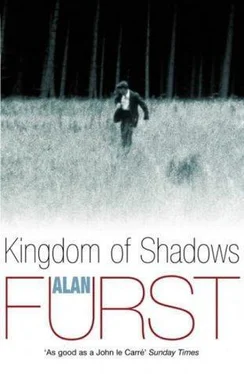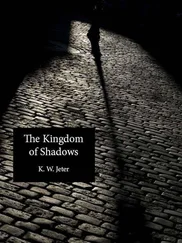Alan Furst - Kingdom of Shadows
Здесь есть возможность читать онлайн «Alan Furst - Kingdom of Shadows» весь текст электронной книги совершенно бесплатно (целиком полную версию без сокращений). В некоторых случаях можно слушать аудио, скачать через торрент в формате fb2 и присутствует краткое содержание. Жанр: Шпионский детектив, на английском языке. Описание произведения, (предисловие) а так же отзывы посетителей доступны на портале библиотеки ЛибКат.
- Название:Kingdom of Shadows
- Автор:
- Жанр:
- Год:неизвестен
- ISBN:нет данных
- Рейтинг книги:5 / 5. Голосов: 1
-
Избранное:Добавить в избранное
- Отзывы:
-
Ваша оценка:
- 100
- 1
- 2
- 3
- 4
- 5
Kingdom of Shadows: краткое содержание, описание и аннотация
Предлагаем к чтению аннотацию, описание, краткое содержание или предисловие (зависит от того, что написал сам автор книги «Kingdom of Shadows»). Если вы не нашли необходимую информацию о книге — напишите в комментариях, мы постараемся отыскать её.
Kingdom of Shadows — читать онлайн бесплатно полную книгу (весь текст) целиком
Ниже представлен текст книги, разбитый по страницам. Система сохранения места последней прочитанной страницы, позволяет с удобством читать онлайн бесплатно книгу «Kingdom of Shadows», без необходимости каждый раз заново искать на чём Вы остановились. Поставьте закладку, и сможете в любой момент перейти на страницу, на которой закончили чтение.
Интервал:
Закладка:
Polanyi frowned. “It seems a great indulgence to me, that sort of thing.” He stopped to have some more ice cream. “By the way, have you had any luck, finding a companion for my friend?”
“Not yet.”
“As long as you’re at it, it occurs to me that the lovebirds will need a love nest. Very private, of course, and discreet.”
Morath thought it over.
“It will have to be in somebody’s name,” Polanyi said.
“Mine?”
“No. Why don’t you ask our friend Szubl?”
“Szubl and Mitten.”
Polanyi laughed. “Yes.” The two men had shared a room, and the hardships of emigre life, for as long as anyone could remember.
“I’ll ask them,” Morath said.
They walked for a time, through the Menagerie, into the gardens. They could hear train whistles from the Gare d’Austerlitz. Polanyi finished his ice cream. “I’ve been wondering,” Morath said, “what became of the man I brought to Paris.”
Polanyi shrugged. “Myself, I make it a point not to know things like that.”
It wasn’t hard to see Szubl and Mitten. Morath invited them to lunch. A Lyonnais restaurant, he decided, where a grand dejeuner would keep you going for weeks. They were famously poor, Szubl and Mitten. A few years earlier, there’d been a rumor that only one of them could go out at night, since they shared ownership of a single, ash-black suit.
Morath got there early, Wolfi Szubl was waiting for him. A heavy man, fifty or so, with a long, lugubrious face and red-rimmed eyes and a back bent by years of carrying sample cases of ladies’ foundation garments to every town in Mitteleuropa. Szubl was a blend of nationalities-he never said exactly which ones they were. Herbert Mitten was a Transylvanian Jew, born in Cluj when it was still in Hungary. Their papers, and their lives, were like dead leaves of the old empire, for years blown aimlessly up and down the streets of a dozen cities. Until, in 1930, some good soul took pity on them and granted them Parisian residence permits.
Morath ordered aperitifs, then chatted with Szubl until Mitten returned, the skin of his face ruddy and shining, from the WC. Good God, Morath thought, he hadn’t shaved in there, had he? “Ah, Morath,” Mitten said, offering a soft hand and a beaming theatrical smile. A professional actor, Mitten had performed in eight languages in the films of five nations and played always the same character-best defined by his most recent appearance as Mr. Pickwick in a Hungarian version of The Pickwick Papers. Mitten had the figure of a nineteenth-century cartoon, wide at the middle and tapering on either end, with hair that stood out from his head like a clown wig.
They ordered. Copiously. It was a family restaurant-thick china bowls and heavy platters. Bearing sausage, some of it in oil, slices of white potato fried in butter, fat roasted chickens, salads with haricots blancs and salads with lardoons of bacon. Mont d’Or cheese. And strawberries. Morath could barely see the tablecloth. He spent money on the wine-the ‘26 burgundies-exciting the red-faced patron to smiles and bows.
They walked afterward, down the dark streets that ran from the back of the 5th to the river. “An apartment,” Morath said, “for a clandestine love affair.”
Szubl thought it over. “A lover who won’t rent his own apartment.”
“Very romantic,” Mitten said.
“Very clandestine, anyhow,” said Szubl.
Mitten said, “What are they, prominent?”
“Cautious,” Morath said. “And rich.”
“Ah.”
They waited. Morath said, “Two thousand a month for the love nest. Five hundred for you. One of you signs the lease. If they need a maid, you hire her. The concierge knows you, only you, the friend of the lovers.”
Szubl laughed. “For the five hundred, do we have to believe this?”
“For the five hundred, you know better.”
“Nicholas,” Mitten said, “people like us don’t get away with spying.”
“It isn’t spying.”
“We get put against a wall.”
Morath shook his head.
“So, God willing, it’s only a bank robbery.”
“Love affair,” Morath said.
“Six hundred,” Mitten said.
“All right. Six hundred. I’ll give you money for the furniture.”
“Furniture!”
“What kind of love affair is this?”
They were, to Morath’s surprise, good at it. Quite good. Somehow, in a week’s time, they managed to unearth a selection of love nests. To start, they took him up to Mistress Row, the avenue Foch area, where gorgeous shop girls luxuriated on powder-puff sofas, behind windows draped in pink and gold. In the apartment they took him to, the most recent affaire had evidently ended abruptly, an open tin of caviar and a mossy lemon left in the little refrigerator.
Next, they showed him a large room, formerly servant’s quarters, up in the eaves of an hotel particulier in the Fourth Arrondissement, where nobody ever went. “Six flights of stairs,” Mitten said.
“But very private.”
And for an actual love affair, Morath thought, not the worst choice. A quiet neighborhood, last popular in 1788, and deserted streets. Next, a taxi up to Saint Germain-des-Pres, to a painter’s atelier on the rue Guenegaud, with a pretty blue slice of the Seine in one of the windows. “He paints, she models,” Szubl said.
“And then, one afternoon, Fragonard!”
Morath was impressed. “It’s perfect.”
“For a Parisian, I’m not so sure. But if the lovers are, perhaps, foreign, well, as you can see, it’s pure MGM.”
“Tres chic,” Szubl said.
“And the landlord’s in prison.”
Their final choice was, obviously, a throwaway. Perhaps a favor for a friend-another Szubl, a different Mitten, penniless and awash in a Gallic sea. Two rooms, barely, at the foot of the Ninth Arrondissement, near the Chaussee d’Antin Metro stop, halfway down the side street-the rue Mogador-just behind the Galeries Lafayette department store. The streets were full of people, shopping at the Galeries or working there. At Christmas, children were brought here to see the mechanical pere Noel in the window.
The apartment was on the third floor of a nineteenth-century tenement, the exterior dark with soot and grime. Inside, brown walls, a two-burner stove, toilet in the hall, limp net curtains, yellow with age, a table covered with green oilcloth, a couch, and a narrow bed with a page of an illustrated Hungarian calendar tacked to the wall above the pillow- Harvest in Esztergom.
“Well, Morath, here it is!”
“Gives you a stiff pencil just to see this bed, right?”
“ Ma biche, ma douce, that army blanket! That coat rolled up for a pillow! Now is our moment! Undress-if you dare!”
“Who’s your friend?”
“Laszlo.”
“Nice Hungarian name.”
“Nice Hungarian man.”
“Thank him for me-I’ll give you some money to take him to dinner.”
“So then, it’s the first one, right? The pink boudoir?”
“Or the atelier. I have to think it over.”
They left the apartment and walked downstairs. Morath headed toward the street door but Mitten took his elbow. “Let’s go the other way.”
Morath followed, through a door at the opposite end of the hallway, across a narrow courtyard in perpetual shadow, then through another door and down a corridor where several men and women were talking and smoking cigarettes.
“Where the hell are we?”
“The Galeries. But not the part the public sees. It’s where the clerks go for a cigarette. Sometimes it’s used for deliveries.”
They came to another door, Szubl opened it and they were on the street floor of the department store, amid crowds of well-dressed people carrying packages.
Читать дальшеИнтервал:
Закладка:
Похожие книги на «Kingdom of Shadows»
Представляем Вашему вниманию похожие книги на «Kingdom of Shadows» списком для выбора. Мы отобрали схожую по названию и смыслу литературу в надежде предоставить читателям больше вариантов отыскать новые, интересные, ещё непрочитанные произведения.
Обсуждение, отзывы о книге «Kingdom of Shadows» и просто собственные мнения читателей. Оставьте ваши комментарии, напишите, что Вы думаете о произведении, его смысле или главных героях. Укажите что конкретно понравилось, а что нет, и почему Вы так считаете.












